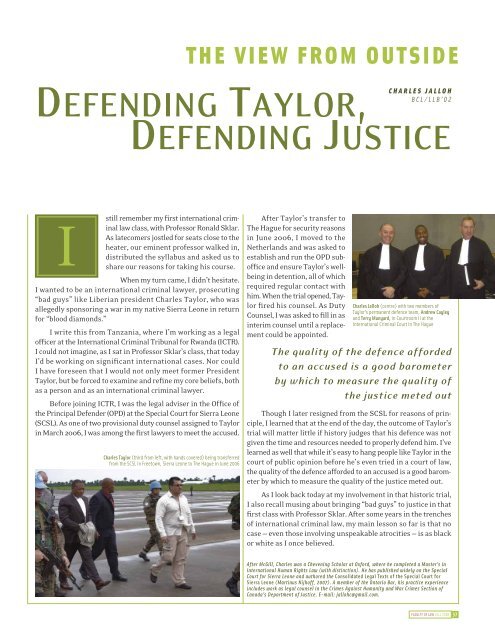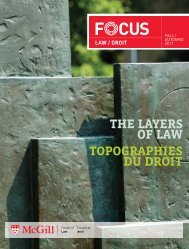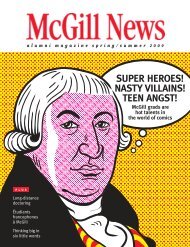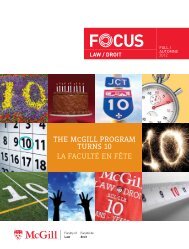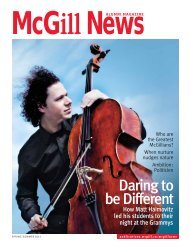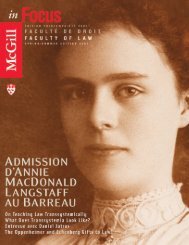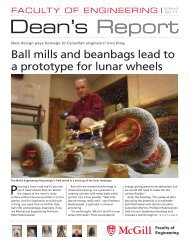McGILL'S FACULTY OF LAW: MAKING HISTORY - Publications ...
McGILL'S FACULTY OF LAW: MAKING HISTORY - Publications ...
McGILL'S FACULTY OF LAW: MAKING HISTORY - Publications ...
You also want an ePaper? Increase the reach of your titles
YUMPU automatically turns print PDFs into web optimized ePapers that Google loves.
DEFENDING TAYLOR,<br />
DEFENDING JUSTICE<br />
I<br />
still remember my first international criminal<br />
law class, with Professor Ronald Sklar.<br />
As latecomers jostled for seats close to the<br />
heater, our eminent professor walked in,<br />
distributed the syllabus and asked us to<br />
share our reasons for taking his course.<br />
When my turn came, I didn’t hesitate.<br />
I wanted to be an international criminal lawyer, prosecuting<br />
“bad guys” like Liberian president Charles Taylor, who was<br />
allegedly sponsoring a war in my native Sierra Leone in return<br />
for “blood diamonds.”<br />
I write this from Tanzania, where I’m working as a legal<br />
officer at the International Criminal Tribunal for Rwanda (ICTR).<br />
I could not imagine, as I sat in Professor Sklar’s class, that today<br />
I’d be working on significant international cases. Nor could<br />
I have foreseen that I would not only meet former President<br />
Taylor, but be forced to examine and refine my core beliefs, both<br />
as a person and as an international criminal lawyer.<br />
Before joining ICTR, I was the legal adviser in the Office of<br />
the Principal Defender (OPD) at the Special Court for Sierra Leone<br />
(SCSL). As one of two provisional duty counsel assigned to Taylor<br />
in March 2006, I was among the first lawyers to meet the accused.<br />
Charles Taylor (third from left, with hands covered) being transferred<br />
from the SCSL in Freetown, Sierra Leone to The Hague in June 2006<br />
T H E V I E W F R O M O U T S I D E<br />
After Taylor’s transfer to<br />
The Hague for security reasons<br />
in June 2006, I moved to the<br />
Netherlands and was asked to<br />
establish and run the OPD suboffice<br />
and ensure Taylor’s wellbeing<br />
in detention, all of which<br />
required regular contact with<br />
him. When the trial opened, Taylor<br />
fired his counsel. As Duty<br />
Counsel, I was asked to fill in as<br />
interim counsel until a replacement<br />
could be appointed.<br />
C H A R L E S J A L L O H<br />
B C L / L L B ’ 0 2<br />
Charles Jalloh (centre) with two members of<br />
Taylor’s permanent defence team, Andrew Cayley<br />
and Terry Munyard, in Courtroom II at the<br />
International Criminal Court in The Hague<br />
The quality of the defence afforded<br />
to an accused is a good barometer<br />
by which to measure the quality of<br />
the justice meted out<br />
Though I later resigned from the SCSL for reasons of principle,<br />
I learned that at the end of the day, the outcome of Taylor’s<br />
trial will matter little if history judges that his defence was not<br />
given the time and resources needed to properly defend him. I’ve<br />
learned as well that while it’s easy to hang people like Taylor in the<br />
court of public opinion before he’s even tried in a court of law,<br />
the quality of the defence afforded to an accused is a good barometer<br />
by which to measure the quality of the justice meted out.<br />
As I look back today at my involvement in that historic trial,<br />
I also recall musing about bringing “bad guys” to justice in that<br />
first class with Professor Sklar. After some years in the trenches<br />
of international criminal law, my main lesson so far is that no<br />
case — even those involving unspeakable atrocities — is as black<br />
or white as I once believed.<br />
After McGill, Charles was a Chevening Scholar at Oxford, where he completed a Master’s in<br />
International Human Rights Law (with distinction). He has published widely on the Special<br />
Court for Sierra Leone and authored the Consolidated Legal Texts of the Special Court for<br />
Sierra Leone (Martinus Nijhoff, 2007). A member of the Ontario Bar, his practice experience<br />
includes work as legal counsel in the Crimes Against Humanity and War Crimes Section of<br />
Canada’s Department of Justice. E-mail: jallohc@gmail.com.<br />
<strong>FACULTY</strong> <strong>OF</strong> <strong>LAW</strong> FALL 2008 37


